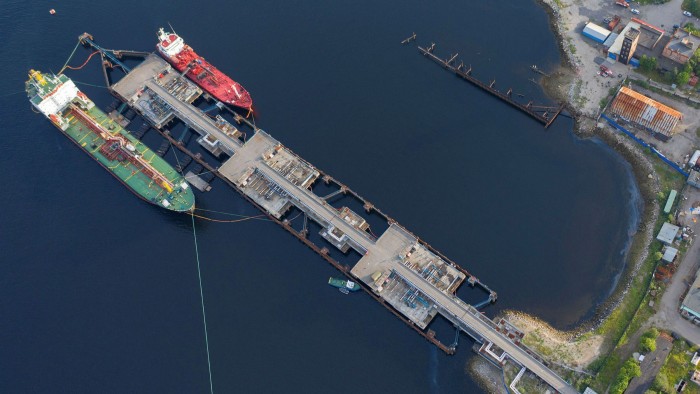Russian oil exports to India surge as Europe shuns cargoes

Simply sign up to the Oil myFT Digest -- delivered directly to your inbox.
Russian oil exports to India have quadrupled this month in a sign of the vast reshaping of global energy flows since Russia’s invasion of Ukraine.
India, the world’s third-largest energy consuming country, has snapped up multiple cargoes of Russian oil from traders as buyers in Europe shunned the country’s vast commodities market following western sanctions on Moscow.
Russia has exported 360,000 barrels a day of oil to India in March so far, nearly four times the 2021 average. The country is on track to hit 203,000 b/d for the whole month based on current shipment schedules, according to Kpler, a commodities data and analytics firm. Export data represent cargoes that have been loaded on to tankers and are en route to India.
Alex Booth, head of research at Kpler, said India typically buys CPC, a blend of predominantly Kazakh and Russian crude, but the big increase in March was for Russia’s flagship Urals crude, suggesting Indian buyers weighed up significant discounts against public opinion.
“Already committed oil cargoes from Russia that can’t find buyers in Europe are being bought by India,” he said. “Exports to India surged in March before any official announcement by New Delhi.”
On Tuesday, White House press secretary Jen Psaki warned that India would be on the wrong side of history if it bought Russian oil, although she acknowledged the purchases would not violate US sanctions.
Historically, Russian crude oil has constituted below 5 per cent of India’s total imports, which were 4.2mn b/d last year.
“Indian companies weren’t sourcing much from Russia given high shipping costs,” said Vivekanand Subbaraman, research analyst at Ambit Capital. “This appears to be changing now.”
Lars Barstad, chief executive of Frontline, a New York-listed tanker company, said that the discount on Russian Urals was about $25-30 a barrel, whereas freight rates would only add $3-4 per barrel, making the trade economic.
Frontline and other tanker companies have been avoiding trading Russian oil because of the complexity of complying with sanctions, but many oil majors and traders are legally bound under contracts to keep lifting Russian barrels.
Twice weekly newsletter

Energy is the world’s indispensable business and Energy Source is its newsletter. Every Tuesday and Thursday, direct to your inbox, Energy Source brings you essential news, forward-thinking analysis and insider intelligence. Sign up here.
India and Russia have a longstanding partnership, from defence to trade, and Putin visited India last December — only his second overseas trip since the pandemic. New Delhi has so far abstained on UN votes condemning Russian aggression.
With 85 per cent of India’s crude needs covered by imports, higher oil prices act as a drag on its treasury.
Subbaraman said: “I think that all three state-owned refiners will purchase oil from Russia given how import dependent and politically sensitive energy is for Indians.”
Speaking to Indian lawmakers this week, Indian oil minister Hardeep Singh Puri stressed that energy prices in India have not soared as much as they have in Europe and the US, rising only 5 per cent. India would act in the interest of local consumers within “the margin of persuasion”, he added.
Russia’s deputy prime minister Alexander Novak and Singh Puri spoke by phone last week. “We are interested in further attracting Indian investment to the Russian oil and gas sector and expanding Russian companies’ sales networks in India,” Novak said.
Indian officials have said that the central bank and government are looking at establishing a rupee-rouble trading mechanism, which would facilitate trade after western restrictions on international payments to and from Russia.
The two countries have several joint energy interests. Rosneft owns 49 per cent of Nayara Energy, which runs India’s second largest refinery.
India’s Ministry of Petroleum and Natural Gas, Indian Oil Corporation and Nayara Energy did not respond to requests for comment.
Trade Secrets
The Trade Secrets Newsletter is the FT’s must-read email on the changing face of international trade and globalisation. Written by FT trade specialist Alan Beattie, it is delivered to your inbox every Monday. Sign up here
Comments